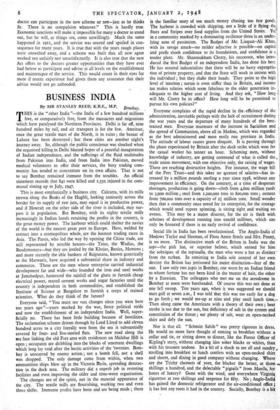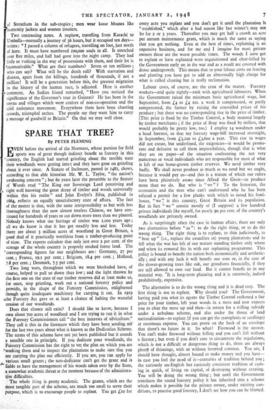BUSINESS INDIA
By SIR STANLEY REED, K.B.E., M.P. Bombay.
THIS is the " other India "—the India of a few hundred millions free, or comparatively free, from the massacres and migrations which have paralysed the Northern Provinces. Delhi is far off, nine hundred miles by rail, and air transport is for the few. Amritsar, once the great textile mart of the North, is in ruins ; the bazaar of Lahore has been destroyed ; but these cities are another night's journey away. So, although the public conscience was shocked when the organised killing in Delhi blasted hopes of a peaceful inauguration of Indian independence, and the sufferings of the fluid multitudes from Pakistan into India, and from India into Pakistan, moved medical volunteers to offer their services, the busy trading com- munity has tended to concentrate on its own affairs. That is not to say Bombay remained immune from the troubles. An official statement records that 841 were killed and 1,350 injured in the com- munal rioting up to July, 1947.
This is most emphatically a business city. Calcutta, with its mills strewn along the Banks of the Hughli, looking anxiously across the border for its supply of raw jute, may equal it in productive power, and if Howrah on the other side of the river is included, may sur- pass it in population. But Bombay, with its eighty textile mills increasingly in Indian hands retaining the profits in the country, is the great money power. The harbour which could shelter the navies of the world is the nearest great port to Europe. Here, welded by contact into a cosmopolitan whole, are the keenest trading races in Asia. The Parsis, who led the way by opening the China trade, are still represented by notable houses—the Tatas, the Wadias, the Readymoneys—but they are jostled by the Khojas, Banias, Memons ; and more recently the able bankers of Rajputana, known generically as the Marwaris, have acquired a substantial share in industry and commerce. These are the men whose enterprise carried industrial development far and wide—who founded the iron and steel works at Jamshedpur, harnessed the rainfall of the ghats to furnish cheap electrical power, reared cement works and sugar factories until the country is independent in both commodities, and established the Institute of Science at Bangalore to furnish a corps of trained scientists. What do they think of the future?
Everyone said, " You must see vast changes since you were here ten years ago "—years marked by the war, fierce political strife and now the establishment of an independent India. Well, super- ficially no. There has been little building because of hostilities. The reclamation scheme driven through by Lord Lloyd to add eleven hundred acres to a city literally won from the sea is substantially covered by four- and five-storied flats. The new road along the sea face linking the old Fort area with residences on Malabar Hill is open ; occupants are dribbling into the blocks of tenement dwellings which long lay void after the hectic activities of the 'twenties. Bom- bay is unscarred by enemy action ; not a bomb fell, not a shell was dropped. The only damage came from within, when two ammunition ships blew up in the Victoria Basin, spreading destruc- tion in the dock area. The military did a superb job in restoring facilities and even improving the older and time-worn organisation.
The changes are of the spirit, not in the material appearance of the city. The textile mills are flourishing, working two and even three shifts. Immense profits have been and are being made ; there
is the familiar story of too much money chasing too few goods. The harbour is crowded with shipping, not a little of it flying the. Stars and Stripes over food supplies from the United States. Yet in a community marked by a dominating resilience there is an under- lying note of pessimism. The Budget of Mr. Liaquat-Ali Khan, with its savage attack—no milder adjective is possible—on capital and profit shook confidence to its foundations, and confidence is a tender plant. Mr. Shanmukham Chetty, his successor, who intro- duced the first Budget of an independent India, has done his best. He has assured industrialists that there will be no hasty expropria- tion of private property, and that the State will work in unison with the individual ; but they shake their heads. They point to the high level of taxation ; surtax is even stiffer than in Britain, and income tax makes salaries which seem fabulous to the older generation in- adequate to the higher cost of living. And they ask, "How long 1 will Mr. Chetty be in office? How long will he be permitted to pursue his own policies?"
Everyone complains of the rapid decline in the.efficiency of the administration, inevitable perhaps with the lack of recruitment during the war years and the departure of many hundreds of the best- trained men. Everyone murmurs of the increase in Swialism and the spread of Communism, above all in Madras, which was regarded as the best administered and most easily run province in India. The attitude of labour causes grave disquiet. It is passing through the phase experienced by Britain after the dock strike which won for the casual worker his tanner an hour. Scheming men, without knowledge of industry, are getting command of what is called the , trade union movement, with one objective only, the raising of wages. These are reaching destructive heights. For instance, the wage bill of the Port Trust—and this takes no account of salaries—has in- creased by a million pounds sterling a year since 1938, without any improvement in efficiency. On the contrary, at a time of desperate shortages, production is going down—cloth from 4,600 million yards to 3,900 million ; steel from 1,200,000 tons to 800,000 tons ; cement from 7oo,000 tons over a capacity of 21- million tons. Small wonder then that a community once noted for its enterprise, for the courage which would send rupees spinning, is sitting tight and waiting on events. This may be a major disaster, for the air is thick with scheines of development running into untold millions, which can only be financed if there is an early revival of confidence.
Social life in India has been revolutionised. The Anglo-India of Medows Taylor and Sleeman, of Flora Annie Steele and Mrs. Penny, is no more. The distinctive mark of the Briton in India was the topi—the pith hat, or superior helmet, which earned for him the sobriquet of the topiwalla, the man who wore a hat as distinct"' from the turban. In remitting to India sole control of her own destiny the Briton has jettisoned his major distinction—fear of the sun. I saw only two topis in Bombay, one worn by an Indian friend to whom fortune has not been kind in the matter of hair, the other by a Eurasian. The colleagues who met me on the aerodrome in Bombay at noon were bareheaded. Of course this was not done at one fell swoop. Ten years ago, when it was suggested we should start golf at seven a.m., I was told that this was too early for a dog to go forth ; we would tee-up at nine and play until lunch
Then along came the Americans with a theory of their own ; heat stroke is not due to the sun, but deficiency of salt in the system and constriction of the throat ; eat plenty of salt, wear an open-necked shirt and defy the sun.
Nor is that all. " Schmitt Sahib " was pretty rigorous in dress. He would no more have thought of coming to breakfast without a collar and tie, or sitting down to dinner, like the Forest Officer of Kipling's story, without changing into sober blacks or whites, than with his trousers undone. Its a bit of a shock to see all and sundry, strolling into breakfast or lunch coatless with an open-necked shirt and shorts, and dining in good company without changing. Where are the Trichy cheroots of yore, the blacker the better, at three -" shillings a hundred, and the delectable " pigtails " from Manila, for hours of luxury? Gone with the wind, and everywhere Virginia cigarettes at two shillings and tenpence for fifty. No ; Anglo-India has gained the domestic refrigerator and the air-conditioned office; it has lost any roots it had in the country. Socially, Bombay is a bit of Streatham in the sub-tropics ; men wear loose blouses like ternity jackets and women trousers.
Two contrasting notes. A nephew, travelling from Karachi to Umballa—normally a journey of 36 hours, but it occupied ten days— writes : "I passed a column of refugees, travelling on foot, just north of here. It must have numbered 200,000 souls in all. It stretched over five miles, and half had gone into the night camp. They had little or nothing in the way of possessions with them, and their lot is Inconceivable." What are their numbers? Seven or ten millions ; who can say? What will be the death roll? With starvation and disease, apart from the killings, hundreds of thousands, if not a million! It will be a generation before this, the greatest migration in the history of the human race, is adjusted. Here is another comment. An Indian friend remarked, " Have you noticed the significance of the Governor's tour in Gujarat? He has been in the towns and villages which were centres of non-co-operation and the civil resistance movement. Everywhere there have been cheering crowds, triumphal arches. The people say they want him to carry a message of goodwill to Britain." On that we may well close.







































 Previous page
Previous page